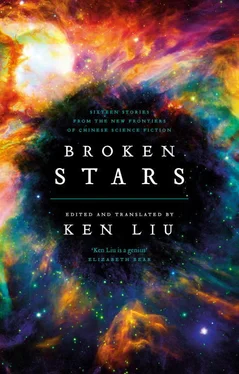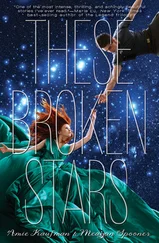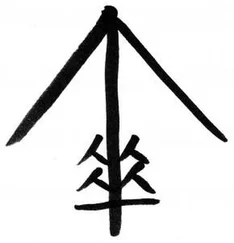Having devoted almost its entire life to this career, the robot launched into its answer without delay. “I believe tall tales please both the teller and the listener. This is partly because the sharp glare of the truth can injure mortal senses and strike fear into the hearts of the common people. It’s thus necessary to disguise the truth in the form of ridiculous stories so that they may then seep into fragile and suspicious nerves. Even if these dull minds cannot extract the beneficial truth hidden therein, at least the blunted instrument would not injure them too much….”
The old man’s frown, which had relaxed just a fraction, tightened again. He was not entirely satisfied.
The robot continued, “ However , after many years of worldly experience, I think tall tales give pleasure simply from the imagination’s leap into the infinite. It’s no different from humanity’s desire to fly. The pleasure alone is reason enough; no other explanation is needed.”
A relieved smile crinkled the old man’s face. “That is a good answer.” He retrieved a sword-shaped pencil from a sleeve. “When I was in the mortal realm, I once wielded this to conquer the world and build my kingdom. Here, in the country of Death, I used it to erase light and trap everything in darkness. Now I pass it on to you with the hope that you’ll find a good use for it. Ah, there, the fire is about to go out. Everything is going to sleep.”
The branch added by the robot had turned to ash. Dull, thudding footsteps echoed not too far away.
“You don’t have much time,” said the old man, whose smile faded as the light dimmed.
“Would you come with me?” The robot held on to the pencil tightly.
“I’m a slave who belongs here for eternity. Go now. Remember, I help you not out of some deep plot or scheme, but simply a desire to see the look of defeat on his face. Even once would be enough for me.”
Only a few dying sparks remained among the ashes, just enough to illuminate the white beard, shaped like the curve of a smile. Then, nothing but darkness.
Without wasting a moment, the robot pulled out the pipe. Earlier, when it had rummaged around for the branch from the poet, it had discovered that the pipe was made from an eraser. Now it swept the pipe through the darkness, and an arc of light tore apart the primeval chaos. The noise of footsteps halted momentarily before redoubling as the unseen hunter rushed forward.
The robot erased with all its might until it managed to rub out a circle in the darkness, which was just big enough for it to crawl through—this had been computed earlier as the result of its 97,466,000,000,000,001st calculation. It fell through the hole onto muddy ground and immediately turned around to color in the hole with the pencil.
By the faint light from the hole, the robot could see the pale hand of Death reaching out of the portal between the worlds. Fortunately, the robot had already drawn an X across the hole, which barred the hand from coming through. The robot worked hard to color in the four quadrants. At first, the pencil strokes were rushed and uneven, and it was possible to hear Death’s sighs on the other side. Later, after reassuring itself that everything was all right, the robot patiently, meticulously, and evenly filled out every millimeter of space, ensuring that not even a single pixel would be left untouched. It colored until the pencil was just a stub too small to hold. After checking over everything to be sure the seal was tight, the robot relaxed and fell asleep.
By the time the boy woke up, he felt sore all over. All around him was muddy soil, and he found himself leaning against a thick tree root. The boy finally remembered that he had fallen into a deep pit in the ground. Overhead the shape of the sky was irregular, and a few people were leaning over the edge of the hole, looking down. The noise of more anxious people filled the air as they argued about how to rescue him.
Some bug was crawling over the back of his neck. Carefully, the boy caught it and gazed at its wriggling, tiny legs in his palm. His stomach rumbled with hunger. Everything was so new, so interesting, and he wanted a big meal to reward himself for everything he had been through this afternoon.
After filling his belly, the next order of business would be to regale his audience with his adventures. Even without any poetic license, he was sure that they had never heard such strange tales.
The adults always think they’re so wise and they know everything. They’d never take a kid’s words seriously. They’ll say I made it all up…. But who cares! Someday they’ll know I’m telling the truth.
Well, it doesn’t matter if they call me a liar. As long as they enjoy my tales and laugh heartily, I’ll help them.
Zhang Ran graduated from Beijing Jiaotong University with a degree in Computer Science. After a stint in the IT industry, he became a reporter and news analyst with Economic Daily and China Economic Net , during which time his news commentary won a China News Award. In 2011, he quit his job and moved to southern China to become a full-time author. He began publishing science fiction in 2012, with his debut short story “Ether,” which won the Yinhe Award as well as the Xingyun Award. His novella, “Rising Wind City,” won the Silver Yinhe Award and the Silver Xingyun Award.
He’s a fan of classic rock and for years ran a coffee shop in Shenzhen with his partner, where customers were encouraged to share their stories. He also enjoys taking unusual trips—to get to Worldcon in Helsinki in 2017, for example, he took the train all the way from Shenzhen, in southern China, up north to Beijing and then across Siberia, stopping at Moscow and St. Petersburg along the way.
In translation, his fiction may be found in Clarkesworld and Watchlist: 32 Stories by Persons of Interest , among other places.
“The Snow of Jinyang” straddles the line between chuanyue , a genre of time-travel fiction whose closest English analog would be something like Mark Twain’s A Connecticut Yankee in King Arthur’s Court , and traditional science fiction. The text is replete with playful references to popular tropes in chuanyue fiction, actual history, and contemporary life. It may be helpful to read the story twice, once without the footnotes, and once with.
A special note of thanks to my cotranslator Carmen Yiling Yan, who also worked with me on Anna Wu’s “The Restaurant at the End of the Universe: Laba Porridge.” Our debates and experiments in the process of overcoming some of the trickiest translation problems I’ve ever encountered made this a really fun and memorable experience.
THE SNOW OF JINYANG [10] Translated by Carmen Yiling Yan and Ken Liu.
Jinyang (晋阳) was an ancient city located in modern-day Shanxi Province, China. This story takes place in the tenth century CE, during the late Five Dynasties and Ten Kingdoms period, when the land we think of as China today was divided among multiple independent states. Jinyang was the capital of a state that called itself Han—or “Great Han,” though we know it as the “Northern Han.” (Northern Han should not be confused with the original Han Dynasty, which fell in the second century, or the Han ethnic group. The ruling family of the Northern Han was ethnically Shatuo, but had the same surname, Liu, as the rulers of the Han Dynasty. It was common for a regime to claim descent and take the name of a prior dynasty to add legitimacy.)
Historically, in 979 CE, the Song Emperor Zhao Guangyi conquered Northern Han, capturing Jinyang after a long siege. Zhao then razed Jinyang to the ground to prevent future rebellions. Today, the city of Taiyuan stands near its ruins.
Читать дальше












